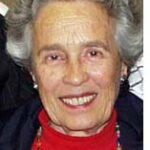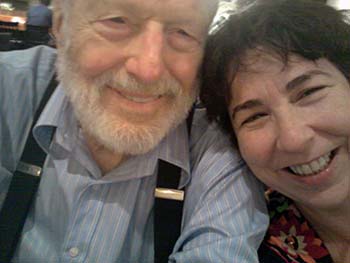By Eileen Wingard


LA JOLLA, California — “The Beloved Voice of Theodore Bikel” will be the first program in a new three-part series of Treasures from the Music Collection of the Astor Judaica Library. Over a dozen selections, sung by the great folk singer, actor, and political activist, will be heard during the free presentation on Thursday afternoon, February 22, from 2 p.m. to 3:30 p.m. at the library within the Lawrence Family JCC, 4126 Executive Drive.
I will be hosting the program, and my special guest will be Aimee Ginsburg Bikel, who was Theodore Bikel’s wife during the last years of his life and founder and director of the Theodore Bikel Legacy Project.
The songs were selected to illustrate Bikel’s vast range and the large number of his recordings in our Astor Judaica Library. It will open with two Yiddish songs, “Der Rebbe Elemelach (The Rabbi Elemelach)” and “Mayn Shtetele Belz (My Little Town, Belz)” from Bikel’s first recording, Theodore Bikel Sings Jewish Folksongs. Other Yiddish songs will be “Tsum Hemerl (To the Little Hammer)” from the album he recorded shortly before his death, While I Am Here, and the ever popular “Tumbalalayka.” Hebrew selections will include “El Ginat Egoz (To the Nut Tree Grove),” “Hana’ava Babanot (Here Come the Daughters),” and “Leshana Haba’a (To Next Year).” There will also be songs in English, “Two Brothers,” “Kretchma,” and “Blow the Candles Out,” and songs in Russian, Sotho, Portuguese, and French.
Aimee Ginsburg Bikel, a graduate of the Hebrew University, is a prize-winning journalist. She received the Ariela Yashiv prize for doing the most to improve the status of Israeli women, writing on topics such as sexual harassment in the work place, pay gaps, and LGBTQ+ issues. For fifteen years, she served as the foreign correspondent in India for Israel’s largest newspaper, Yedioth Achronoth. Since the death of Theodore, she has devoted much of her time promoting his legacy.
Theodore Meir Bikel was born in Vienna in 1924. His father was the leader of the Socialist Zionists, and in 1938, he was able to get one of the few visas to take his family to mandate Palestine after the Nazis took over Austria. Theodore tried his hand at agriculture on a kibbutz, but soon gravitated to Tel Aviv to join the Habima Theater. He and a few others broke away to form the Cameri Theater, which still exists today. He then went to England to study at the Royal Academy of Dramatic Art and had roles on the London stage. He came to the United States in 1955.
He appeared in films, including The African Queen (1951), Moulin Rouge (1952), The Kidnappers (1953), The Enemy Below (1957), I Want to Live! (1958), My Fair Lady (1964), The Russians Are Coming, the Russians Are Coming (1966), and 200 Motels (1971).
On the Broadway stage, he created the role of Captain von Trapp opposite Mary Martin as Maria in the original Broadway production of Rodgers & Hammerstein’s The Sound of Music. In 1969, Bikel took over the Broadway role of Tevye in the musical Fiddler on the Roof, a role he performed more often than any other actor. The production won nine Tony Awards and was one of the longest-running musicals in Broadway history.
Theodore Bikel was also a widely recognized and recorded folk singer and guitarist. In 1959, he co-founded the Newport Folk Festival with Pete Seeger. Bikel died in 2015 at the age of 91.
The other two programs in the series, Beloved Jewish Voices will be The Beloved Voice of Debbie Friedman on Thursday, April 4 and The Beloved Voice of Cantor Sheldon Merel on Thursday, June 6. To register for the free Theodore Bikel program, click here.
*
Eileen Wingard is a freelance writer specializing in coverage of the arts.